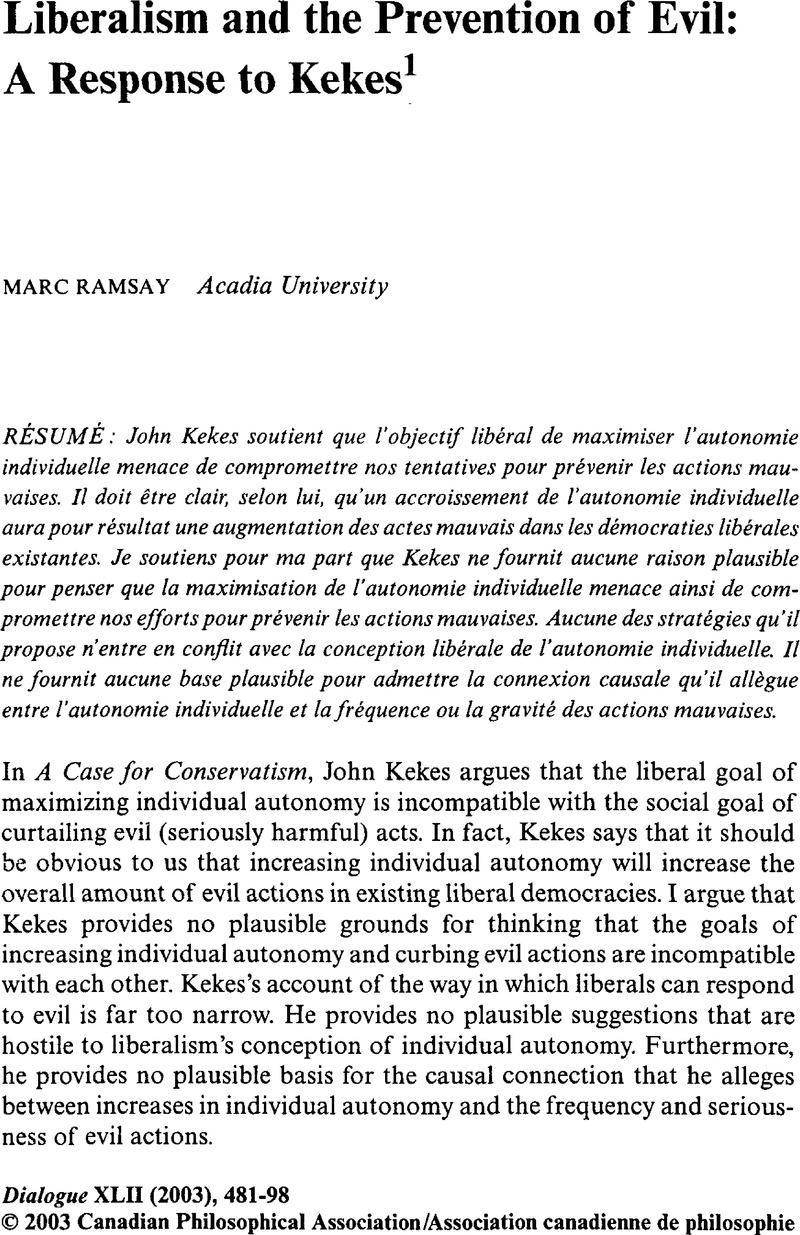No CrossRef data available.
Published online by Cambridge University Press: 13 April 2010

2 An anonymous referee from Dialogue suggested that I make this clear at the outset.
3 Of course, the difference principle is subject to the priority of the First Principle of Justice, as well as the priority of the equality of opportunity component of Rawls's Second Principle of Justice.
4 Bellamy, Richard, Liberalism and Pluralism: Towards a Politics of Compromise (New York: Routledge, 1999), p. 1.Google Scholar
5 Kekes, John, A Case for Conservatism (Ithaca, NY: Cornell University Press, 1998), pp. 69–70.Google Scholar
6 There is something suspicious about the use of the term “evil” here. Kekes wishes to distinguish himself from liberals in that he, unlike them, is concerned with evil. But all of the acts that he describes as evil can also be understood in terms of harm or wrongdoing.
7 Kekes, A Case for Conservatism, p. 72.
8 Ibid., pp. 72–73.
9 Ibid., p. 75
10 Ibid., p. 78.
11 Ibid., p. 81.
12 Ibid., p. 85.
13 Ibid., p. 86.
14 Ibid., p. 79
15 Ibid., p. 86
16 Ibid., p. 87.
17 Ibid.
18 Ibid.
19 Burke, Edmund, “Reflections on the Revolution in France,” in The Portable Burke, edited by Kramnick, Isaac (London: Penguin Books, 1999), pp. 442–43.Google Scholar
20 Burke, Edmund, On Empire, Liberty, and Reform: Speeches and Letters, edited by Bromwich, David (New Haven, CT: Yale University Press, 2000), pp. 273–74.Google Scholar
21 Banfield, Edward, “In Defense of the American Party System,” in Political Parties U.S.A., edited by Goldwin, Robert A. (Chicago, IL: Rand McNally, 1964), pp. 37–38. I first found this passage from Bansfield in Isaac Kramick's introduction to The Portable Edmund Burke.Google Scholar
22 When Burke spoke of the presumption in favour of existing British political institutions, he had in mind a record of historical experience running much longer than several decades. One might argue that, from his perspective, the jury is still out with respect to the viability of contemporary democracies.
23 Burke, “Reflections on the Revolution in France,” pp. 446–48.
24 A Case for Conservatism was published before many of the recent instances of shootings in American high schools. Now Kekes might offer these events as further evidence for his claim about the prevalence of evil. But concerns about the eruption of violence in affluent American high schools does not sit well with Kekes's own plan for combatting evil. Curbing distributive justice will affect poor and lower-middle-class communities, while leaving prosperous suburbs undisturbed in terms of resources for mischief. Perhaps Kekes would argue that we should not do more to create such environments, since we know the trouble that their prosperity causes. In other words, highly affluent communities do not deal well with their excessive prosperity, so it would be dangerous to force them to share substantial amounts of their prosperity with others. Again, we should consider how this line of argument would be perceived from the perspective of the lower classes that are expected to forego the benefits of distributive justice